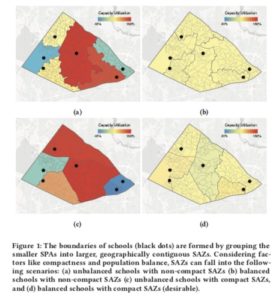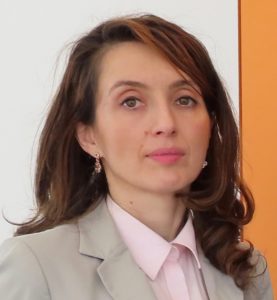from www.dac.cs.vt.edu
DAC Student Spotlight: Andreea Sistrunk
When Andreea Sistrunk started taking classes at Virginia Tech in the fall of 2014 she had left her job as a full time teacher in Northern Virginia to devote more time to her two young daughters, ages three and seven.
“It was becoming more difficult for me to hold a full time job and be a good mother so I chose to take a break from work,” Sistrunk said. “I used a sort of ‘mom’s night out’ to enroll in a graduate course at Virginia Tech because I really missed learning new things.”
Sistrunk was drawn to computer science. She held a bachelor of science degree in engineering with a minor in childhood education from University Polytechnica in Bucharest, Romania, and was a licensed teacher for K-12 and Advanced Placement classes in mathematics, computer science, and technology.
From that course, she eventually applied to the Computer Science program and earned a master’s degree with a concentration in data analytics in Fall 2019. Currently, Sistrunk is in the Ph.D. program and a student at the Discovery Analytics Center, where her advisor is Naren Ramakrishnan.
Sistrunk has gone back to work full time as a research scientist in a laboratory outside of the
university that focuses on geospatial research. She believes that the combination of work and furthering her education has added a competitive edge to her work as a data scientist.
“I am grateful for the rigor and world class education I am receiving,” Sistrunk said. “My advisor has helped me refine my research direction while I take classes in data science, ethics, and artificial intelligence.”
Sistrunk cited other DAC faculty instrumental in her learning experience. Among them are Chandan Reddy, whose class on artificial intelligence “not only gave me exposure to the newest algorithms in machine learning, reinforcement learning, and deep learning, but taught me how to implement them. It was a super tough but so worth every single minute,” she said.
And what she learned from Chang-Tien Lu about various algorithms in centrality and geospatial information systems “actually helped me get my current job,” she said.
 Sistrunk’s research focuses on the intersection of computer science, public schools, and geographical information systems.
Sistrunk’s research focuses on the intersection of computer science, public schools, and geographical information systems.
At DAC, she has been part of a team developing Redistrict, an online interactive platform that uses data analytics and machine learning to help parents and other stakeholders better understand school rezoning plans and their potential effect on the community; share their comments and concerns about proposed plans; propose changes to boundaries; and even create their own plans. The team has been working with the Loudoun County Public Schools, among others.
Sistrunk has collaborated on two papers, “REGAL: A regionalization framework for school boundaries,” published in the proceedings of the 27th ACM SIGSPATIAL International Conference on Advances in Geographic Information Systems, November 2019 and Geospatial Clustering for Balanced and Proximal Schools, published in Education Advancements of Artificial Intelligence (EAAI) in January 2020.
She is projected to graduate by 2022.
“It is tough raising children, working, and going to evening classes, but I am so very grateful to my professors allowing me this top notch education,” Sistrunk said. “My experience with the faculty and my colleagues at DAC give me strength to go the extra mile.”
That extra mile includes volunteering. During the 2019-2020 school year, Sistrunk volunteered for Girls in Cyberjitsu, and ran a club at Marshall Elementary School in Manassas for STEAM arduino circuits robocrafts.
DAC Student Spotlight: Andreea Sistrunk
When Andreea Sistrunk started taking classes at Virginia Tech in the fall of 2014 she had left her job as a full time teacher in Northern Virginia to devote more time to her two young daughters, ages three and seven.
 |
| Andreea Sistrunk, DAC Ph.D. student in Computer Science |
Sistrunk was drawn to computer science. She held a bachelor of science degree in engineering with a minor in childhood education from University Polytechnica in Bucharest, Romania, and was a licensed teacher for K-12 and Advanced Placement classes in mathematics, computer science, and technology.
From that course, she eventually applied to the Computer Science program and earned a master’s degree with a concentration in data analytics in Fall 2019. Currently, Sistrunk is in the Ph.D. program and a student at the Discovery Analytics Center, where her advisor is Naren Ramakrishnan.
Sistrunk has gone back to work full time as a research scientist in a laboratory outside of the
university that focuses on geospatial research. She believes that the combination of work and furthering her education has added a competitive edge to her work as a data scientist.
“I am grateful for the rigor and world class education I am receiving,” Sistrunk said. “My advisor has helped me refine my research direction while I take classes in data science, ethics, and artificial intelligence.”
Sistrunk cited other DAC faculty instrumental in her learning experience. Among them are Chandan Reddy, whose class on artificial intelligence “not only gave me exposure to the newest algorithms in machine learning, reinforcement learning, and deep learning, but taught me how to implement them. It was a super tough but so worth every single minute,” she said.
And what she learned from Chang-Tien Lu about various algorithms in centrality and geospatial information systems “actually helped me get my current job,” she said.
 Sistrunk’s research focuses on the intersection of computer science, public schools, and geographical information systems.
Sistrunk’s research focuses on the intersection of computer science, public schools, and geographical information systems.At DAC, she has been part of a team developing Redistrict, an online interactive platform that uses data analytics and machine learning to help parents and other stakeholders better understand school rezoning plans and their potential effect on the community; share their comments and concerns about proposed plans; propose changes to boundaries; and even create their own plans. The team has been working with the Loudoun County Public Schools, among others.
Sistrunk has collaborated on two papers, “REGAL: A regionalization framework for school boundaries,” published in the proceedings of the 27th ACM SIGSPATIAL International Conference on Advances in Geographic Information Systems, November 2019 and Geospatial Clustering for Balanced and Proximal Schools, published in Education Advancements of Artificial Intelligence (EAAI) in January 2020.
She is projected to graduate by 2022.
“It is tough raising children, working, and going to evening classes, but I am so very grateful to my professors allowing me this top notch education,” Sistrunk said. “My experience with the faculty and my colleagues at DAC give me strength to go the extra mile.”
That extra mile includes volunteering. During the 2019-2020 school year, Sistrunk volunteered for Girls in Cyberjitsu, and ran a club at Marshall Elementary School in Manassas for STEAM arduino circuits robocrafts.
